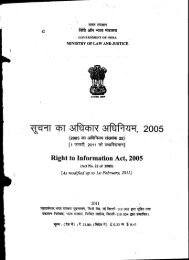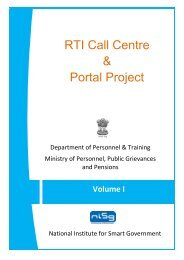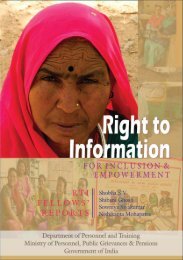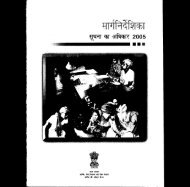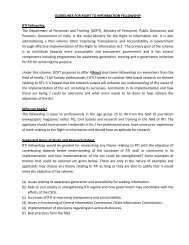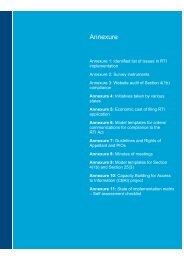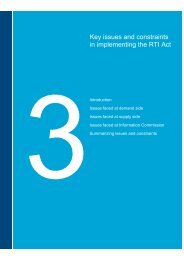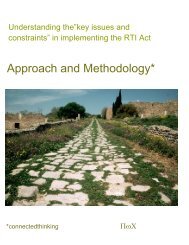Progress made so far - Right to Information Act
Progress made so far - Right to Information Act
Progress made so far - Right to Information Act
Create successful ePaper yourself
Turn your PDF publications into a flip-book with our unique Google optimized e-Paper software.
State Government<br />
• Various State Governments had already enacted laws<br />
for access <strong>to</strong> information in <strong>so</strong>me form or the other,<br />
like –Tamil Nadu (1997), Goa (1997), Rajasthan<br />
(2000), Karnataka (2000), Delhi (2001), Maharashtra<br />
(2002), Madhya Pradesh (2003), Assam (2002) and<br />
Jammu and Kashmir (2004).<br />
• Post the enactment of the Central <strong>Act</strong>, <strong>so</strong>me State<br />
Governments have taken innovative initiatives in line<br />
with the spirit of the <strong>Act</strong>. The key initiatives are:<br />
- Jankari Call Centre, Government of Bihar: Bihar<br />
Government has initiated a six seater call centre.<br />
This call centre facilitates a caller in drafting the<br />
RTI application and the fee is collected through<br />
the phone bill. Requisite changes have been<br />
<strong>made</strong> in the rules for acceptance of the<br />
application through this channel. Similarly RTI<br />
Helpline in Bangalore is providing RTI<br />
information <strong>to</strong> citizens<br />
- <strong>Information</strong> Commission “regional offices” in<br />
Maharashtra: As per Section 15(7) of the RTI<br />
<strong>Act</strong>, the SIC can increase their geographical<br />
reach through establishing offices at other<br />
places. Maharashtra has created 5 offices of<br />
2.2. Previous studies<br />
the <strong>Information</strong> Commission in Pune, Mumbai,<br />
Aurangabad, Amravati and Nagpur <strong>to</strong> enable<br />
citizens <strong>to</strong> approach the most convenient<br />
regional office<br />
- “Train the Trainer” concept in Assam: Assam has<br />
adapted a “Train the Trainers” concept, where the<br />
Government trains the CSOs/NGOs <strong>to</strong> impart<br />
training <strong>to</strong> citizens on RTI in order <strong>to</strong> maximize the<br />
reach of RTI and ensure that there is local<br />
ownership and sustainability<br />
- Review of Public Authorities by Andhra Pradesh<br />
State <strong>Information</strong> Commission<br />
- Public hearings at the district headquarters by<br />
Kerala State <strong>Information</strong> Commission<br />
- The CIC website has a feature for online<br />
submission of complaints and second appeals<br />
While the contribution <strong>made</strong> by the above entities is<br />
acknowledged, there is still a long way <strong>to</strong> go <strong>to</strong> establish<br />
transparency and accountability through RTI. The<br />
expectations/actions required from the appropriate<br />
Governments are significant, <strong>so</strong>me clearly articulated in<br />
the <strong>Act</strong> and <strong>so</strong>me are implied. This report tries <strong>to</strong> bring<br />
out both the aspects in its recommendations.<br />
In the last 3 years, there have been a large number of studies carried out by various organizations assessing various<br />
aspects of RTI regime. A significant number of them have focused on tracking the status of RTI at various levels and<br />
emerging recommendations. These studies were referenced while identifying the preliminary list of implementation<br />
issues. Some of the key studies used as reference material are mentioned below:<br />
Second Administrative Reforms Commission (2006)<br />
The Second Administrative Reforms Commission was constituted <strong>to</strong> prepare a detailed blueprint for revamping the public<br />
administration system. The Commission was given wide terms of reference covering all aspects of public administration. The<br />
Commission in its first report decided <strong>to</strong> analyze and give recommendations on the freedom of information as the <strong>Right</strong> <strong>to</strong><br />
<strong>Information</strong> <strong>Act</strong>.<br />
Tracking <strong>Right</strong> <strong>to</strong> <strong>Information</strong> in eight states - 2007<br />
This report was developed by Society of Participa<strong>to</strong>ry Research in Asia (PRIA). This study aimed at analysing the<br />
experiences of information seekers in accessing information under the RTI <strong>Act</strong> using Civil Society Organisations. Further, this<br />
study captured the details of working of State <strong>Information</strong> Commission and State Nodal Department for RTI implementation.<br />
PricewaterhouseCoopers Final Understanding the “Key Issues and Constraints” in implementing the RTI <strong>Act</strong>*<br />
28



